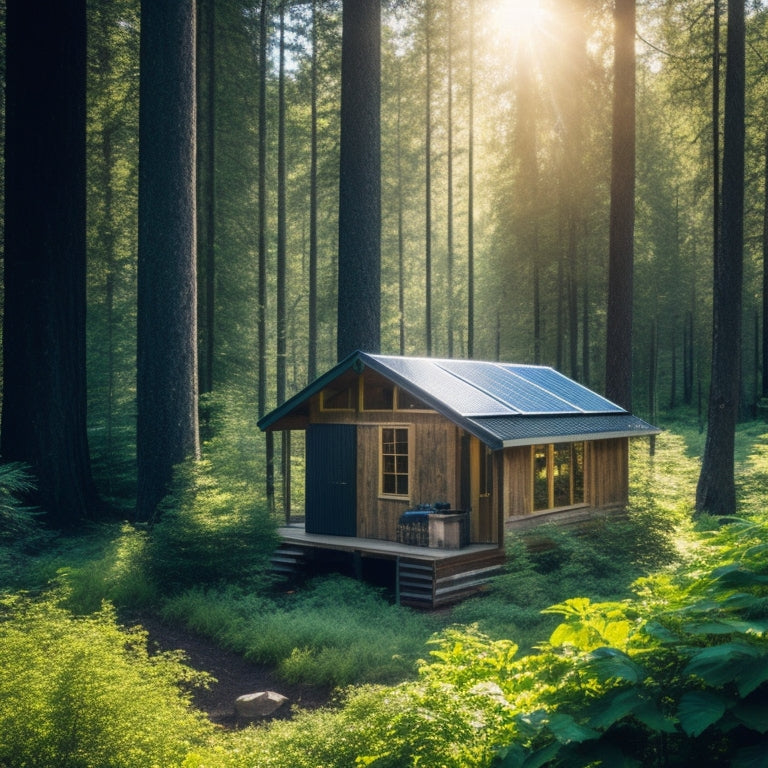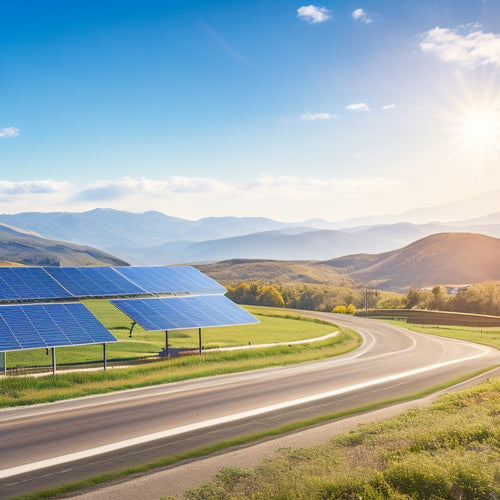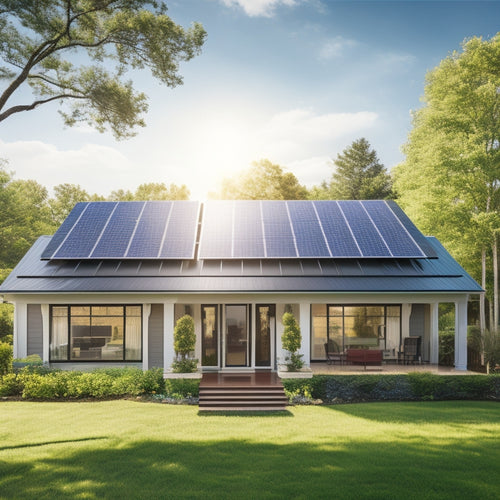
What Are the Best Solar Power Packages for Off-Grid Living
Share
The best solar power packages for off-grid living prioritize energy independence and efficiency. You should look for high-quality solar panels, such as monocrystalline types for better performance, paired with reliable battery storage, like lithium batteries for longevity. Confirm your package includes a comprehensive energy management system to optimize consumption. Assess your energy needs accurately by calculating daily wattage and consider seasonal variations. Combining these elements enhances self-sufficiency and reduces utility costs over time. Exploring various packages can help tailor a solution that fits your lifestyle and energy consumption habits perfectly, revealing even more advantageous options ahead.
At a Glance
- Evaluate solar packages based on energy output and battery storage capacity to meet specific off-grid energy needs.
- Consider high-efficiency solar panels like monocrystalline for better performance and longevity in energy production.
- Look for packages that include reliable lithium battery storage for optimal energy access during low sunlight periods.
- Research available federal and state incentives to maximize affordability and long-term savings on solar installations.
- Prioritize solar packages that promote energy independence and self-sufficiency, enhancing your commitment to renewable energy.
Cost-Effective Long-Term Savings
Investing in solar power considerably reduces your energy bills over time, allowing you to allocate funds to other essential areas of off-grid living.
Additionally, you can take advantage of government incentives that further enhance your savings.
Lower Energy Bills
A well-designed solar power package can greatly reduce your energy bills, making it a cost-effective solution for off-grid living. By capturing renewable energy, you're not only diminishing reliance on traditional utilities but also stabilizing your long-term expenses.
With the right setup, you can generate your own electricity, effectively eliminating monthly power bills.
To maximize savings, consider implementing energy efficiency tips alongside your solar system. Simple changes, like using LED lighting or energy-efficient appliances, can considerably lower your overall energy consumption.
Additionally, integrating smart home technology allows you to monitor and manage energy use more effectively, optimizing your solar energy production.
Smart thermostats, automated lighting systems, and energy monitoring apps can improve your energy management, ensuring you make the most of your solar power efficiently.
These tools enable you to make informed decisions about your energy consumption, ultimately leading to even lower costs.
Investing in a strong solar package, combined with intelligent energy management strategies, positions you for financial freedom.
As you adopt this sustainable lifestyle, you'll enjoy decreased energy bills while contributing to a greener planet, aligning perfectly with your desire for independence from grid reliance.
Government Incentives Available
Leveraging government incentives can greatly enhance the affordability of solar power packages for off-grid living. By tapping into federal rebates and state incentives, you can considerably reduce your upfront costs.
Federal tax credits, such as the Investment Tax Credit (ITC), allow you to deduct a substantial percentage of your solar installation costs from your federal taxes, making it easier to invest in a sustainable energy solution.
Additionally, many states offer unique incentives designed to encourage solar adoption. These state incentives might include cash rebates, grants, or sales tax exemptions, which can further decrease your financial burden.
Some states even provide performance-based incentives that reward you for the energy your system generates over time, effectively creating a steady income stream.
When you combine these federal and state incentives, your long-term savings can be impressive. Not only do you reduce the initial investment, but you also benefit from lower energy bills and increased property value.
Ultimately, understanding and utilizing these incentives can enable you to achieve true energy independence while optimizing your investment in solar power.
Environmental Impact Reduction
When you choose solar power for off-grid living, you're considerably reducing your carbon footprint by utilizing sustainable energy sources.
This change not only lessens greenhouse gas emissions but also promotes energy independence. By investing in solar technology, you contribute to a cleaner environment and support the movement towards renewable energy solutions.
Additionally, adopting solar power can lead to considerable energy savings, allowing you to reduce reliance on fossil fuels while embracing a more sustainable lifestyle.
Reduced Carbon Footprint
Solar power packages designed for off-grid living greatly reduce your carbon footprint, offering a sustainable alternative to fossil fuels. By utilizing renewable resources, you tap into a clean energy source that diminishes greenhouse gas emissions. This shift to solar energy not only curtails your reliance on non-renewable sources but also aligns with eco-friendly practices that benefit the environment.
When you opt for solar, you're making a conscious choice to decrease air pollution and conserve natural resources. Each kilowatt-hour generated from solar panels considerably lowers the carbon emissions associated with traditional energy consumption.
In addition, off-grid solar systems allow you to operate independently, minimizing the environmental impact of energy transport and infrastructure. Embracing solar power means you're participating in a larger movement toward environmental stewardship.
Sustainable Energy Sources
Utilizing sustainable energy sources is essential for reducing environmental impact and cultivating a more resilient ecosystem. When you choose renewable energy, such as solar, wind, or hydropower, you're not just opting for a cleaner alternative; you're actively participating in the shift towards energy independence.
These energy sources have minimal carbon emissions compared to fossil fuels, markedly lowering your carbon footprint.
Energy efficiency plays an important role in this equation. By optimizing the energy you consume, you can guarantee that every watt generated from your renewable sources is used effectively. This means investing in high-quality appliances, smart home technologies, and energy-efficient designs that minimize waste.
Furthermore, embracing sustainable energy promotes resilience against fluctuating energy markets and environmental uncertainties. You're not just securing your energy needs; you're contributing to a larger movement aimed at combating climate change and preserving natural resources for future generations.
Key Components Overview
When setting up your off-grid solar power system, understanding the types of solar panels available and your battery storage options is vital. Each solar panel type offers different efficiencies and costs, impacting your overall energy production.
Selecting high-efficiency inverters (>95%) can also enhance your energy harvesting capabilities, guaranteeing that your system operates at its best.
Additionally, selecting the right battery storage solution assures you have reliable energy access when sunlight isn't available, making it imperative to take into account battery bank design and management for peak performance.
Solar Panels Types
Choosing the right type of solar panel is essential for maximizing energy efficiency in off-grid living. You have several options, each with unique characteristics that fit your needs and lifestyle.
| Type of Solar Panel | Key Features |
|---|---|
| Monocrystalline Panels | High solar panel efficiency, longer lifespan, often backed by better warranties. |
| Polycrystalline Panels | Generally lower cost, decent efficiency, slightly shorter lifespan than monocrystalline. |
| Thin Film Technology | Lightweight and flexible, lower efficiency but can be integrated into various surfaces. |
| Bifacial Solar | Captures sunlight from both sides, enhancing overall energy generation. |
| Flexible Solar | Ideal for irregular surfaces, portable, but usually lower efficiency. |
When you evaluate these options, consider solar panel efficiency and lifespan alongside warranties. Monocrystalline panels often lead the pack in efficiency and longevity, making them a solid investment for freedom-seekers. Polycrystalline panels provide a cost-effective solution, while thin film technology offers versatility. Bifacial and flexible solar panels cater to specific needs, giving you the freedom to customize your energy setup. Your choice will greatly impact your off-grid experience, so weigh these factors carefully.
Battery Storage Options
After selecting the right solar panels, the next step in optimizing your off-grid energy system involves understanding battery storage options.
You'll primarily choose between lithium batteries and lead acid batteries. Lithium batteries are known for their longer lifespan and higher efficiency, but they come with a higher initial cost. Lead acid batteries are more affordable upfront but require more maintenance and have a shorter lifespan.
When evaluating capacity ratings, consider how much energy storage you need to match your lifestyle. Installation options vary, with some batteries designed for easy DIY setups, while others may require professional assistance.
Pay attention to inverter compatibility, as not all batteries work seamlessly with every inverter.
To maximize your battery's lifespan, adopt effective maintenance tips, like monitoring charging cycles and keeping terminals clean. Remember that charging cycles affect longevity; frequent deep discharges can notably shorten battery life.
Ultimately, the right battery storage solution will enhance your off-grid systems, ensuring you have reliable energy storage for your needs.
Assess Your Energy Requirements
To effectively power your off-grid lifestyle, you need to calculate your daily energy needs based on your appliances and usage patterns. This includes taking stock of your device power ratings and usage hours to create an accurate energy profile.
It's also essential to take into account seasonal variations, as energy production from solar panels can fluctuate throughout the year. By understanding these factors, you can design a solar power system that meets your specific requirements, ensuring a consistent and reliable energy supply for your home.
For more guidance on this topic, refer to assessing energy consumption patterns.
Calculate Daily Energy Needs
Understanding your daily energy needs is vital for designing an effective solar power system for off-grid living. Start by calculating your energy consumption for all devices you plan to use. List each appliance, its wattage, and the average hours you'll run it daily. This will provide a clear depiction of your total energy requirements.
Next, sum the watt-hours for each device. For example, if you have a 100-watt light bulb you use for five hours, that's 500 watt-hours. Repeat this for all appliances and add them together to get your daily energy consumption in watt-hours. This figure will guide your solar panel and battery selection.
Power management is important, too. Consider energy-efficient appliances to reduce your overall consumption. Implementing smart usage habits, like using devices during peak sunlight hours, can optimize your energy production.
This calculated approach not only strengthens your off-grid lifestyle but also guarantees you utilize the full potential of your solar power system. By understanding your daily energy needs, you take control of your energy independence, laying the groundwork for a sustainable, self-sufficient living environment.
Consider Seasonal Variations
Seasonal variations greatly impact your energy requirements when living off-grid. As the seasons change, so do your energy consumption patterns, necessitating seasonal adjustments in your solar power setup.
During winter, shorter days and increased heating needs can lead to higher energy demands, while in summer, longer days and potential cooling requirements might shift your usage.
To handle these fluctuations effectively, analyze your energy efficiency throughout the year. Identify which appliances or systems consume the most energy and consider alternatives that can perform better under varying conditions.
For instance, solar panels may generate less power in winter, so you might need to increase battery storage or supplement with a backup generator during that season.
Additionally, optimizing your energy consumption during peak sunlight hours can greatly enhance your overall energy efficiency. Integrating smart energy management systems can also help you monitor usage and adjust accordingly, ensuring you're prepared for any seasonal shifts.
Higher Energy Independence Potential
By choosing the right solar power package, you can notably enhance your energy independence.
These systems offer self-sufficiency options that reduce your reliance on traditional energy sources, allowing you to generate and store your own electricity.
This increased autonomy not only lowers your utility bills but also contributes to a more sustainable lifestyle.
Enhanced Self-Sufficiency Options
Achieving true energy independence in off-grid living hinges on the selection of solar power packages that prioritize enhanced self-sufficiency. By integrating renewable energy technologies and strong energy management systems, you can optimize your energy output, storage, and consumption, ensuring you're never left in the dark.
To help you evaluate your options, consider the following table comparing key features of various solar power packages:
| Package Type | Energy Output | Storage Capacity |
|---|---|---|
| Standard Solar Kit | 3000 Watts | 10 kWh |
| Advanced Hybrid System | 5000 Watts | 15 kWh |
| Complete Off-Grid Set | 8000 Watts | 25 kWh |
Each package offers distinct advantages depending on your energy needs and lifestyle. The standard solar kit is ideal for minimal consumption, while the advanced hybrid system provides more flexibility with its enhanced output. The complete off-grid set is perfect for those seeking maximum independence and reliability.
Frequently Asked Questions
What Is the Lifespan of Solar Panels Used in Off-Grid Systems?
The lifespan of solar panels typically ranges from 25 to 30 years. Their efficiency can decline gradually, but with proper maintenance, you'll enhance off-grid sustainability, ensuring you capture renewable energy effectively throughout their lifespan.
How Do I Maintain My Off-Grid Solar Power System?
To maintain your off-grid solar power system, regularly check connections and clean panels. Implement system monitoring to track performance. Follow maintenance tips like battery care and inverter inspections to guarantee efficiency and longevity for your energy independence.
Can I Expand My Solar System Later?
You can definitely expand your solar system later. As your energy needs grow, off-grid upgrades allow for solar system expansion. Just guarantee compatibility with existing components to maintain efficiency and maximize your independence.
What Type of Batteries Work Best for Off-Grid Solar Setups?
When choosing batteries for your off-grid solar setup, consider lithium batteries for their efficiency and longevity, while lead acid batteries offer a lower initial cost. Each type has distinct advantages depending on your energy needs and budget.
Are There Specific Brands Recommended for Off-Grid Solar Packages?
When exploring off-grid solar packages, you'll want to contemplate brand comparisons and budget considerations. Renowned brands like Renogy, Goal Zero, and Victron Energy offer reliable options customized to your unique needs and freedom-seeking lifestyle.
Explore More
In the vast terrain of off-grid living, choosing the right solar power package is like planting seeds for a sustainable future. By investing wisely, you not only harvest long-term savings but also cultivate energy independence and reduce your environmental footprint. As you assess your energy requirements and understand key components, you'll find that embracing solar isn't just a choice; it's a commitment to a greener, brighter tomorrow. Take the leap, and let the sun power your dreams.
Related Posts
-

Is Switching to Green Energy Solutions Easy
Switching to green energy solutions isn't just easy; it's also beneficial. You can greatly cut utility costs and enjo...
-

Replacing Old Appliances With Sustainable Alternatives
Replacing old appliances with sustainable alternatives can change your home into an energy-efficient space. Not only ...
-

Home Solar Installation Cost
You're considering installing solar panels on your home, and the upfront cost is likely the biggest hurdle standing i...


